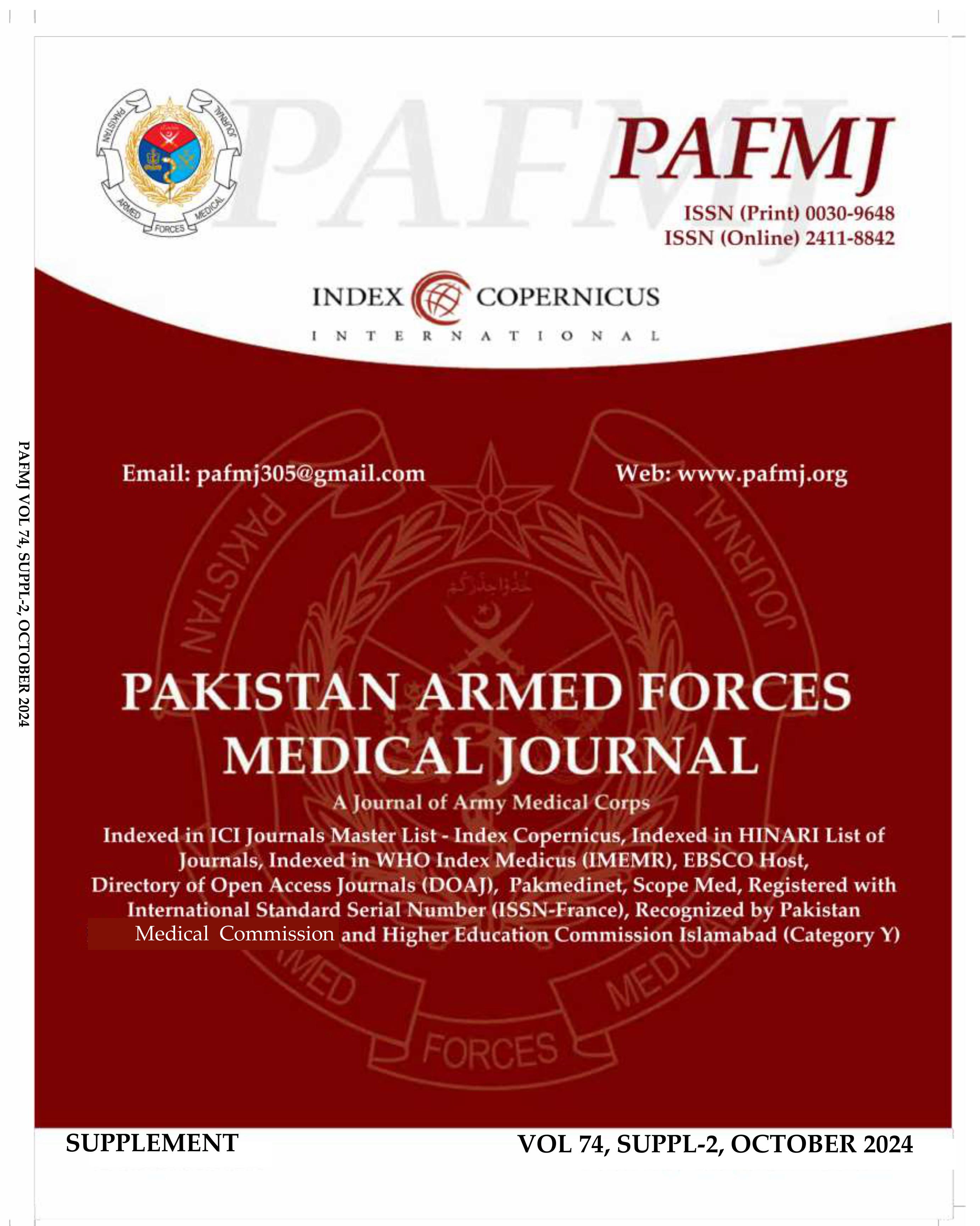Association of Chronic Urticaria With Hepatitis C Infection In Female Patients Visiting Tertiary Care Hospital In Pakistan
DOI:
https://doi.org/10.51253/pafmj.v74iSUPPL-2.7421Keywords:
Anti HCV antibody, Chronic urticaria, Hepatitis C, Urticaria activity score.Abstract
Objective: To evaluate association of chronic urticaria with hepatitis C infection in female patients.
Study Design: comparative cross-sectional study.
Place and Duration of Study: Fauji Foundation Hospital Rawalpindi. One-year duration (Jan 2020-Jan 2021).
Methodology: One Hundred female patients (group 1) of age 60 years or less with chronic urticaria were enrolled in this study. Patients with chronic liver disease or signs of hepatic decompensation were excluded. Equal number of age and gender matched patients not having urticarial symptoms were selected as group 2. Anti-Hepatitis C Virus Antibody (HCV ab) was evaluated by Enzyme linked immunosorbent assay (ELISA). Disease severity was calculated by Urticaria activity score 7(UAS 7). Association of HCV infection with chronic urticaria and its severity was analyzed by applying appropriate statistical tests.
Results: Anti HCV antibody positivity frequency was 14/100(14%) in group 1 and 4/100(4%) in group 2 (p value: 0.013; significant). Mean ages in group 1 and 2 were 39.88+1.38 and 38.79+1.35 years respectively (p value: 0.57; insignificant). Mean UAS 7 calculated in the HCV negative Urticaria cases was 6.73+2.94 while it was significantly higher in HCV positive group i.e. 8.78+6.459 (p value 0.01). Frequency of HCV positivity in patients with well controlled urticaria and mild urticaria was 6/59(10.0%) and 5/36(13.8%) respectively while in moderate urticaria was 3/5(60%) which was significantly higher (p value 0.04).
Conclusion: There is a significant association of chronic urticaria with anti HCV antibody positivity. HCV positive patients have more severe disease as compared to HCV negative patients.
Downloads
References
Yuan I, Katari P, Shaker M. Vitamin D treatment for chronic urticaria: a case report. J Med Case Reports. 2019; 13(1): 193.
Fricke J, Ávila G, Keller T, Weller K, Lau S, Maurer M et al. Prevalence of chronic urticaria in children and adults across the globe: Systematic review with meta-analysis. Allergy. 2020; 75(2): 423-32.
Rather S, Keen A, Sajad P. Serum Levels of 25-hydroxyvitamin D in Chronic Urticaria and its Association with Disease Activity: A Case Control Study. Indian Dermatol Online. J. 2018; 9(3): 170-4.
Kocatürk E, Salman A, Cherrez-Ojeda I, Criado PR, Peter J, Comert-Ozer E, et al. The global impact of the COVID-19 pandemic on the management and course of chronic urticaria. Allergy. 2021; 76(1): 816-830.
Al Kanaani Z, Mahmud S, Kouyoumjian SP, Abu-Raddad LJ. The epidemiology of hepatitis C virus in Pakistan: systematic review and meta-analyses. R Soc Open Sci. 2018; 5(1): 180257.
Irshad R, Ahmed W, Alam SE. Comparison of rapid anti-HCV multi-sure kit with gold standard ELISA. J Coll Physicians Surg Pak. 2019; 29(1): 1053-6.
Kolho E. Specificity and sensitivity of first and second generation anti-HCV ELISA in a low prevalence population. Transfus Med. 1992; 2(1): 239-42.
Aslam MN, Qureshi UF, Ansari MN. Dermatologic manifestations of chronic hepatitis C. Pak J Med Health Sci./ 2019; 13(1): 640-3.
Romano C, Cuomo G, Ferrara R, Mastro AD, Esposito S, Sellitto A, Adinolfi LE. Uncommon immune-mediated extrahepatic manifestations of HCV infection. Expert Rev Clin Immunol. 2018; 14(1): 1089-99.
Ataseven A, Durmaz K, Temiz SA, Dursun R. Clinical and laboratory assessment for the inflammation role in chronic spontaneous urticaria: A clinical study. Dermatol Ther. 2020; 33(1): e14125.
Hollis K, Proctor C, McBride D, Balp MM, McLeod L, Hunter S, et al. Comparison of urticaria activity score over 7days (UAS7) values obtained from once-daily and twice-daily versions: results from the ASSURE-CSU Study. Am J Clin Dermatol. 2018; 19(1): 267-74.
Zaib, Ali IA, Asif M, Naqvi F, Tahir K, Faraz AAK, et al. Association of HCV and chronic urticaria resistant to empirical anti-histamine therapy. J Pak Assoc Dermatologists. 2021; 31(1): 74-7.
Ahmed I, Wahid Z, Ahmed Z. Chronic urticaria: frequency of anti-HCV antibodies. J Pak Assoc Dermatologists. 2003; 13(1): 179-83.
Perveen Z, Zulfiqar M, Manzoor A. Seropositivity of hepatitis C virus in patients of acute and chronic urticaria. Pak J Med Health Sci. 2019; 13(1): 866-8.
Cribier BJ, Santinelli F, Schmitt C, Stoll-Keller F, Grosshans E. Chronic urticaria is not significantly associated with hepatitis C or hepatitis G infection: a case-control study. Arch Dermatol. 1999; 135(1): 1335-9.
Cribier B. Urticaria and hepatitis. Clin Rev Allergy Immunol. 2006; 30(1): 25-9.
Kanazawa K, Yaoita H, Tsuda F, Okamoto H. Hepatitis C virus infection in patients with urticaria. J Am Acad Dermatol. 1996; 35(1): 195-8.
Criado PR, Criado RF, Maruta CW, Reis VM. Chronic urticaria in adults: state-of-the-art in the new millennium. An Bras Dermatol. 2015; 90(1): 74-89.
Downloads
Published
Issue
Section
License
Copyright (c) 2024 Sana Waqar Qureshi, Farid ur Rehman, Bilqees Fatima, Shamsa Kanwal, Sibqa Jamil

This work is licensed under a Creative Commons Attribution-NonCommercial 4.0 International License.















